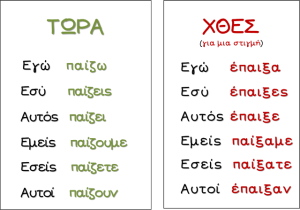Language/Modern-greek-1453/Grammar/Past-Tense
Past tenses
English |
Français |
|---|---|
| Verbs are words that state something about the subject of the sentence
and may express action, event,or condition. The Greek verb can take many different forms which may indicate properties: person, number, voice, tense and mood. Tenses are forms of the verb which show whether the action, the event or condition expressed by the verb is placed in the past, the present or the future. |
Les verbes sont des mots qui indiquent quelque chose sur le sujet de la phrase et peuvent exprimer une action, un événement,ou une condition.
Le verbe grec peut prendre de nombreuses formes différentes qui peuvent indiquer des propriétés: personne, nombre, voix, temps et la mode. Les temps sont des formes du verbe qui montrent si l'action, l'événement ou la condition exprimée par le verbe se situe dans le passé, le présent ou le futur. |
Past continuous / Παρατατικός
Enhlish |
Français |
|---|---|
| 1. Past continuous / Παρατατικός
The verbs in “Παρατατικός ” express the continuing nature of the action or the event taken place in the past. |
1. Le temps imparfait / Παρατατικός:
Le verbe à «Παρατατικός» exprime et décrit des faits et actions dans le passé en soulignant le déroulement ou la répétition de ceux-ci. |
Simple past / Αόριστος
English |
Français |
|---|---|
| 2. Simple past / Αόριστος
The simple past is used to describe an action, an event or condition that occurred in the past without duration. |
2. Le passé simple / Αόριστος
L' "Αόριστος" souligne le fait qu’une action passée, unique et ponctuelle, ou bien venue interrompre une action ou situation en cours, est terminée. |
Present perfect / Παρακείμενος
English |
Français |
|---|---|
| 3. Present perfect / Παρακείμενος
The present perfect expresses an action completed some time in the past with consequences that reach the present.
|
3. Le passé composé / Παρακείμενος
Le "Παρακείμενος" est le temps qui relie le passé et le présent. Le "Παρακείμενος"est utilisé pour décrire: une action ou un événement accompli dans le passé, dont son résultat est détectable dans le présent. Le "Παρακείμενος" est formé en utilisant le verbe auxiliaire έχω (avoir) examp. : 'Εχω γράψει το γράμμα και θα το ταχυδρομήσω. J'ai écrit la lettre et je vais la poster. |
Past perfect / Υπερσυντέλικος
English |
Français |
|---|---|
| 4. Past perfect / Υπερσυντέλικος
shows that the action described by the verb was completed before another past action or a certain point of time. The past perfect is formed by using the past tense of the auxiliary verb : έχω (have)
|
4. Plus-que-parfait / Υπερσυντέλικος
Le "Υπερσυντέλικος" est utilisé pour décrire une action ou un événement survenu dans le passé exprime que l'action décrite par le verbe s'est achevée avant une autre action passée ou un certain moment. Le "Υπερσυντέλικος" est formé en utilisant le «Παρατατικός»(imparfait) du verbe auxiliaire "έχω" : είχα (avoir)
|
Examples
Past continuous / Παρατατικός
| εγώ | έ-παιζ-α ( épeza ) | I was playing |
| εσύ | έ-παιζ-ες (épezes ) | You were playing |
| αυτός, - ή , -ό | έ-παι-ζε ( épeze | He/She/It was playing |
| εμείς | παί-ζα-με ( pézame | We were playing |
| εσείς | παί-ζα-τε (pézate ) | You were playing |
| αυτοί,-ές, -ά | έ-παιζ-αν ( épezan | hey were playing |
Simple past / Αόριστος
| εγώ | έ-παι-ξα ( épexa ) | I played |
| εσύ | έ-παι-ξες ( épexes ) | You played |
| αυτός ,-ή ,-ό | έ-παι-ξε ( épexe ) | He/She/It played |
| εμείς | παί-ξα-με ( péxame ) | We played |
| εσείς | παί-ξα-τε (péxate ) | You played |
| αυτοί ,-ές ,-ά | έ-παι-ξαν (épexan ) | They played |
Present perfect / Παρακείμενος
| εγώ | έχω παίξει ( echo péxi ) | I have played |
| εσύ | έχεις παίξει (echis péxi) | you have played |
| αυτός, -ή, -ό | έχει παίξει ( echi péxi) | he /she / it has played |
| εμείς | έχουμε παίξει (échoume péxi) | we have played |
| εσείς | έχετε παίξει ( échete péxi) | you have played |
| αυτοί, -ές, ά | έχουν παίξει (échoun péxi ) | they have played |
Past perfect / Υπερσυντέλικος
| εγώ | είχα παίξει ( îcha péxi ) | I had played |
| εσύ | είχες παίξει (îches péxi ) | You had played |
| αυτός ,-ή ,ό | είχε παίξει ( îche péxi ) | He/She/It had played |
| εμείς | είχαμε παίξει ( îchame péxi ) | We had played |
| εσείς | είχατε παίξει îchate péxi ) | You had played |
| αυτοί ,-ές ,-ά | είχαν / είχανε παίξει | They had played |
- Ευγενική χορηγία που στοχεύει να βοηθήσει μαθητές ή μη, απανταχού της Γης, που επιδίδονται στην εκμάθηση της ελληνικής γλώσσας!!!
- Contribution bénévole visant à aider les personnes, partout dans le monde, qui sont engagées dans l'apprentissage de la langue grecque !!!
- Voluntary contribution aimed at helping people, all over the world, who are committed to learning the Greek language !!!

